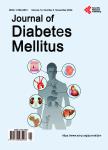Effect of Initiation of Basal Insulin Glargine on Glycemic Control in Patients with Diabetes: Real Life Experience from Hong Kong
Effect of Initiation of Basal Insulin Glargine on Glycemic Control in Patients with Diabetes: Real Life Experience from Hong Kong作者机构:Department of Medicine Tseung Kwan O Hospital Hong Kong China Sanofi (Hong Kong) Ltd. Hong Kong China
出 版 物:《Journal of Diabetes Mellitus》 (糖尿病(英文))
年 卷 期:2017年第7卷第3期
页 面:108-120页
学科分类:1002[医学-临床医学] 100201[医学-内科学(含:心血管病、血液病、呼吸系病、消化系病、内分泌与代谢病、肾病、风湿病、传染病)] 10[医学]
主 题:Glycemic Control Insulin Initiation Insulin Glargine Type 1 Diabetes Mellitus Type 2 Diabetes Mellitus Hong Kong
摘 要:Introduction: To assess the changes in glycemic control after initiating or switching to a basal insulin analogue in patients with diabetes mellitus. Methods: A retrospective, observational analysis was conducted using electronic data from a Hong Kong regional hospital. Data from adult patients with type 1 and 2 diabetes mellitus (T1DM and T2DM, respectively) who had been prescribed with basal insulin glargine in 2008-2010, with recorded HbA1c levels at the time of initiation, at 6 and 12 months thereafter, were analysed. Results: Data from 106 eligible patients were analysed. Substantial reduction in HbA1c and fasting sugar levels were reported in both T1DM (Δ HbA1c = 1.5%, Δ FBG = 1.3 mmol/L p 0.05) and T2DM (Δ HbA1c = 1.2%, Δ FBG = 2.9 mmol/L p 0.05) patients after 12 months of therapy. A total of 42% of T1DM and 26% of T2DM patients achieved HbA1c levels 7.0%. After adjustment, T2DM patients who were insulin naive achieved a statistically greater HbA1c reduction (Δ = 1.7%) than those who previous treated with premixed or basal bolus insulin (Δ = 0.3%) (p 0.05). Percentage of patients experiencing hypoglycaemia reduced from 69% to 62% in T1DM but increased from 26% to 36% in T2DM patients. All hypoglycaemic episodes recorded were either asymptomatic or mild and self-limiting. Only 4% of the patients discontinued treatment at the end of 12 months. Conclusions: In real life clinical practice, a single daily basal insulin analogue therapy provided effective glycemic control with an acceptable risk of mild hypoglycaemia.



